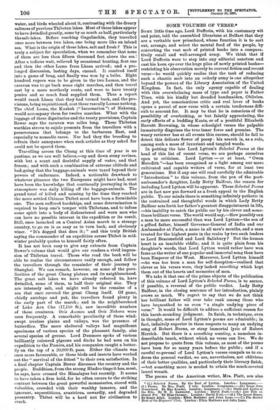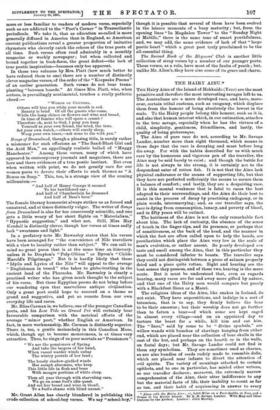SOME VOLUMES OF VERSE.* SOME little time ago, Lord Dufferin,
with his customary wit and point, told the assembled librarians at Belfast that they are a veritable new priesthood, whose function it is to sort out, arrange, and select the mental food of the people, by converting the vast mob of printed books into a compara- tively small and well-arranged army. We think that if Lord Dufferin were to step into any editorial sanctum and cast his keen eye over the huge piles of newly printed books— restricting his observation merely to current fiction and recent verse—he would quickly realise that the task of reducing such a chaotic mob into an orderly army is one altogether beyond the powers of the Library Association of the United Kingdom. In fact, the only agency capable of dealing with this overwhelming mass of type and paper is Father Time, with his kindly but dreaded handmaiden, Oblivion. And yet, the conscientious critic and real lover of books opens a parcel of new verse with a certain tenderness diffi- cult to account for. It may be that be is conscious of the possibility of overlooking, or but faintly appreciating, the early efforts of a budding Keats, or of a youthful Elizabeth Barrett Browning, in whose schoolgirl verses the palpable immaturity disguises the true inner force and promise. The weary reviewer has at all events this excuse, should he fail to detect this delicate flower of poesy : his search is, as a rule, among such a mass of luxuriant and tangled weeds.
In putting the late Lord Lytton's Selected Poems at the head of this list of recent verse, we are perhaps ourselves open to criticism. Lord Lytton — or at least, " Owen Meredith "—has been recognised as a light among our more cultivated and capable writers of verse, for at least two generations. But if any one will read carefully the admirable " Introduction " to this volume, from the pen of the poet- ambassador's daughter, Lady Betty Balfour, the reason for including Lord Lytton will be apparent. These Selected Poems are in fact now put forward as a fresh appeal to the English public. To our minds there is something infinitely pathetic in the restrained and thoughtful words in which Lady Betty Balfour sets forth her father's greatest disappointment in life, —his inability to catch the public ear by his clever and some- times brilliant verse. The world would say,—How possibly can a man be more successful than was Lord Lytton—the son of a gifted father, himself Governor-General of India and our Ambassador at Paris, a name in all men's mouths, and a man trusted for the highest posts in the realm by two such leaders as Lord Beaconsfield and Lord Salisbury ? But the human heart is an insoluble riddle ; and it is quite plain from his daughter's words, that Lord Lytton would rather have won fame as the writer of one popular and immortal song than have been Emperor of the West. Moreover, Lord Lytton himself —he was too keen a man for self-deception—realised that clever as his verses were, they lacked something which kept them out of the hearts and memories of men.
We take it that one of the prime objects of the publication of this volume of Lord Lytton's Selected Poems, is to secure, if possible, a reversal of the public verdict. Lady Betty Balfour, in the closing sentence of her introduction, plainly avows as much. We regret to say that we do not think her brilliant father will ever take rank among those who have bequeathed to us even a single undying piece of verse." It would be difficult to adduce a sufficient reason for this harsh-sounding judgment. In finish, in technique, even in thought, some of Lord Lytton's poems are admirable ; in fact, infinitely superior in these respects to many an undying song of Robert Burns, or stray immortal lyric of Robert Herrick. But there is a something wanting, a nameless in- describable touch, without which no verse can live. We do not propose to quote from this volume, as most of the poems have been for so many years before the public ; and if a careful re-perusal of Lord Lytton's verses compels us to en. dorse the general verdict, we are, nevertheless, not oblivious of their better qualities, and particularly their literary finish, —but something more is needed to attain the much-coveted laurel wreath.
The poems of the American writer, Mrs. Piatt, are also
• (1.) Selected Poems. By the Earl of Lytton. London : Longmane.— (2 ) Poems. By Mrs. Platt. 2 vole. London : Lougmana.—(3.) Songs from Dreamland. By May KendaL London : Longmans.—(4.) Idylls and LOrics of the rule. By H. D. Bawnsley. London : David Nntt.—(5.1 Low Tide OIL Grand Pri. By Bliss Carman. London : David Nntt.—(6.) The Lower Slopes. By Grant Allen. London : Elkin Mathews and John Lane.—(7.) The Second Book of the Ithymere' Club. London : Elkin Mathews and John Lane.
more or less familiar to readers of modern verse, especially such as are addicted to the " Poet's Corner " in Transatlantic periodicals. We take it, that as education so-called is more generally diffused in America than in England, so American current publications reveal a greater proportion of imitative rhymeters who cleverly catch the echoes of the true poets of all time. Such verses often read admirably in a monthly magazine or weekly newspaper ; but when collected and bound together in book-form, the great defect—the lack of true poetic inspiration—becomes only too apparent.
In these two volumes by Mrs. Piatt (how much better to have reduced them to one) there are a number of distinctly clever magazine verses, of the order of the "Keepsake Poems" of an earlier generation. Such verses do not bear trans- planting "between boards." At times Mrs. Platt, who, when serious, is prevailingly sentimental, touches a really pathetic chord :—
" WORDS OF COUNSEL.
Others will kiss you while your mouth is red.
Beauty is brief. Of all the guests who come, While the lamp shines on flowers and wine and bread, In time of famine who will spare a crumb ? Therefore oh, next to God, I pray you keep Yourself as your own friend, the tried, the true. Set your own watch,—others will surely sleep, Weep your own tears,—ask none to die with you."
Songs of Dreamland, though a pleasing title, is surely rather a misnomer for such 'effusions as "The Sand-Blast Girl and the Acid Man," an appallingly realistic ballad of "Muggy
Manchester." Among these verses, many of which have appeared in contemporary journals and magazines, there are
here and there evidences of a true poetic instinct. But even
when written with point, we do not greatly care for our women poets to devote their efforts to such themes as "A Bonus on Soap." This, too, is a strange view of the coming millennium :—
" And half of Henry George it seemed To his bewildered ear ;
And half of Chamberlain he dreamed And half of Bass's beer."
The female literary humourist always strikes us as forced and unnatural, and at times distinctly vulgar. The writer of Songs from Dreamland is also far too consciously scientific, and one gets a little weary of her short flights on " Materialism," " Hypnotic suggestion," and what not. Still, Miss May Kendall is distinctly clever, though her verses at times sadly
lack " sweetness and light."
In a prefatory note Mr. Rawnsley states that his verses have been arranged for "the convenience of Nile travellers with a view to locality rather than subject." We can call to mind no great poem that is at the same time an itinerary,
unless it be Drayton's " Poly-Olbion " or Byron's " Childe Harold's Pilgrimage." But it is hardly likely that these "Idylls and Lyrics of the Nile" will appeal to the average " Englishman in tweed" who takes to globe-trotting in the ancient land of the Pharaohs. Mr. Rawnsley is clearly a practised writer who has given much thought to the subject of his verse. But these Egyptian poems do not bring before our wondering eyes that marvellous antique civilisation. Only a great poet could hope to succeed on a theme so grand and suggestive, and yet so remote from our own everyday life and cares.
Mr. Bliss Carman is, we believe, one of the younger Canadian poets, and his Low Tide on Grand Pre will certainly bear favourable comparison with the metrical efforts of the
average " minor poet," whether English or American. In fact, in mere workmanship, Mr. Carman is distinctly superior.
There is, too, a gentle melancholy in this Canadian Muse, which, though apt to become monotonous, is at times very
attractive. Thus, he sings of us poor mortals as" Pensioners ":
" We are the pensioners of Spring And take the largess of her hand, When vassal warder winds unbar The wintry portals of her land ;
The lonely shadow-girdled winds Her seraph almoners, who keep This little life in flesh and bone With meagre portions of white sleep.
Then all year through with starveling care, We go on some fool's idle quest. And eat her bread and wine in thrall, To a fool's shame with blind unrest."
Mr. Grant Allen has clearly blundered in publishing this crude collection of school-boy verses. We say " school-boy," though it is possible that several of them have been evolved in the leisure moments of a busy maturity ; but, from the opening lines "In Magdalen Tower" to the "Sunday Night at Mabille," there is the same tone of smart youthfulness, and, we may add, the same evidence of lack of that " large poetic heart" which a great poet truly proclaimed to be the all-essential thing.
The Second Book of the Rhymers' Club is another little collection of stray verses by a number of our younger poets. These verses, as a rale, have most of the faults of youth ; but, unlike Mr. Allen's, they have also some of its grace and charm.



















































 Previous page
Previous page